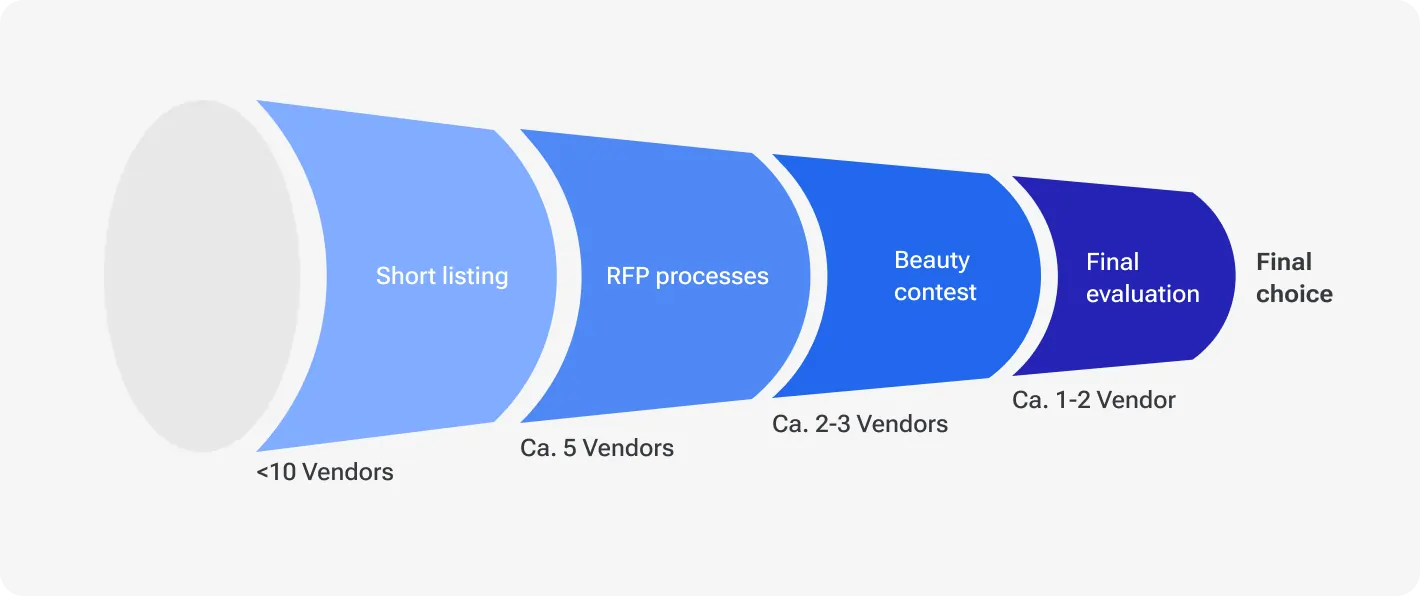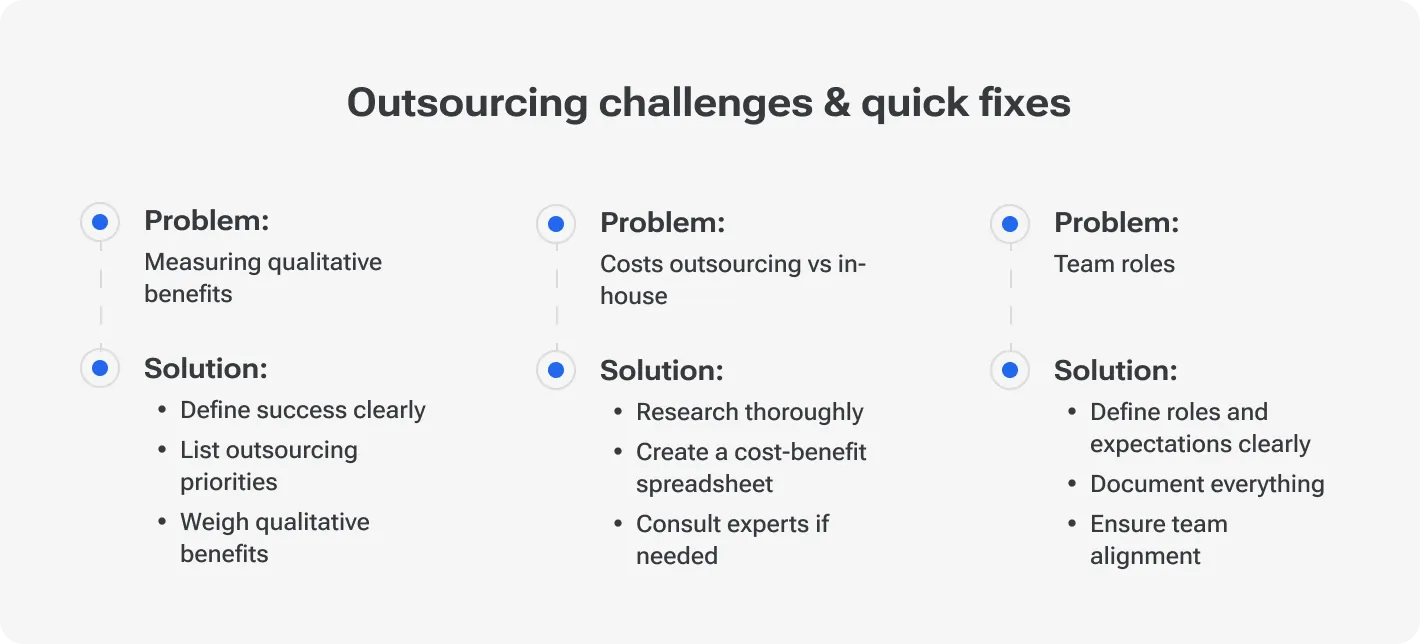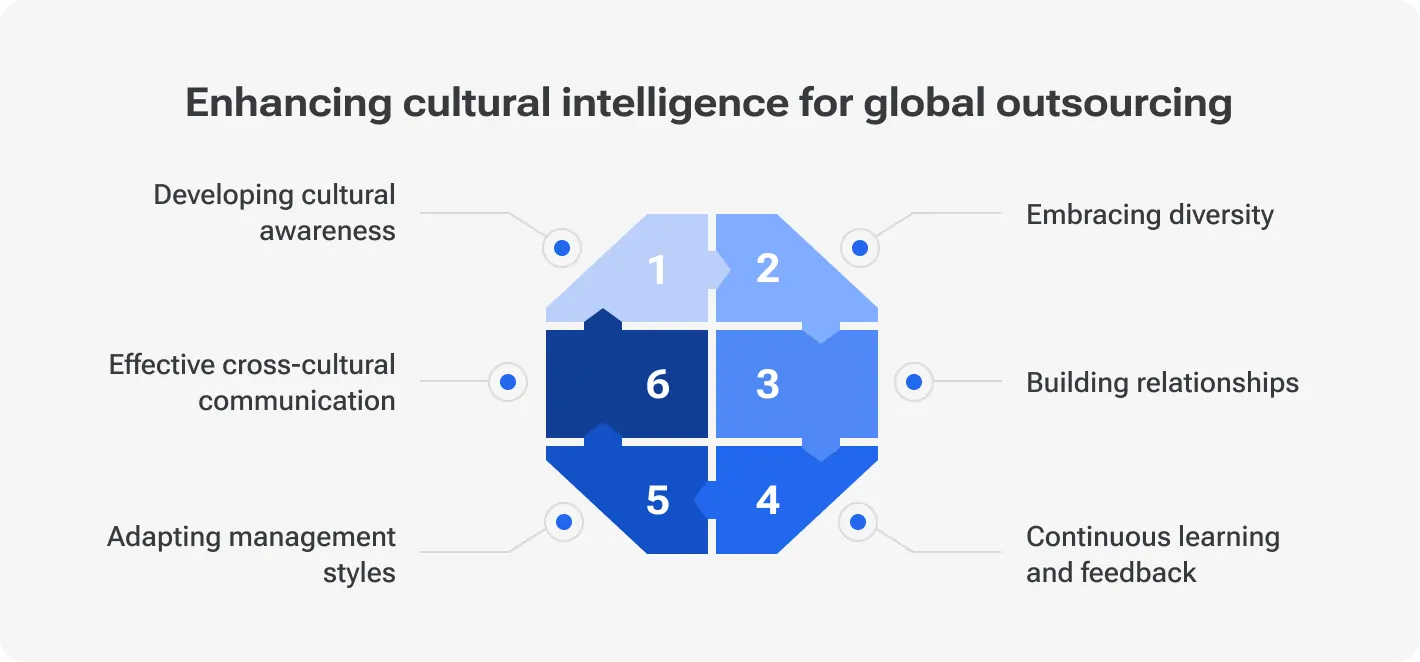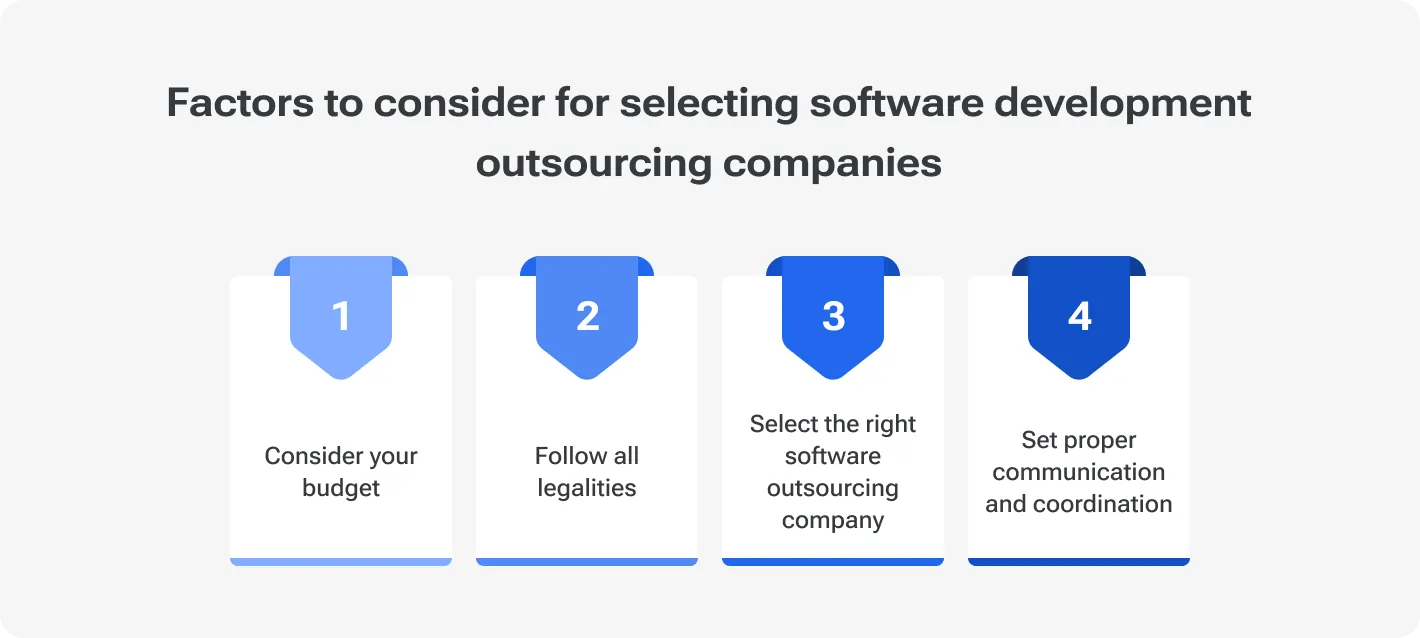In 2026, getting the right IT outsourcing providers onboard often defines the difference between failure and success. Studies reveal that companies thoroughly vetting their outsourcing vendors can reduce project delays by up to 30% and lower overall development costs significantly. Naturally, fewer delays mean your product gets on the market way faster and at a cheaper price. As a result, you get a competitive edge and improve your bottom line at the same time.
In other words, in today’s realities, the effectiveness of any given outsourcing strategy depends on the quality of a software outsourcing company behind. The more accurate your choice will be, the less likely there will be setbacks due to misaligned expectations and unforeseen challenges.
In such a context, preparing the right questions to ask a software vendor becomes the baseline for choosing the right partner. The process can save you time, money, and headaches down the line.
Motivated and focused experts for up to 60% less than locals, delivered in days, not months
The starting questions for selecting the right outsourcing software development companies
One of the first rules in outsourcing software vendor evaluation is to look for a partner that aligns with your business objectives and technical needs. Keeping this in mind, the initial questions to ask software vendors should be all about that.
1. What is your expertise in my industry, and what technology stack do you operate with?
For any good software outsourcing vendor, relevant expertise and a proven track record are the starting point, making this one of the most important questions to ask a software development partner. Besides, it’s essential to confirm that the vendor has relevant experience in your specific industry and is proficient with the technology stack you require. This increases the chances of a smooth project and ensures that potential challenges are anticipated and addressed early on.
Besides, based on the previous case studies and proven expertise you can double-check whether the vendor’s previous clients had the same tasks as yours. You will also check the end product and determine whether the potential vendor managed to fulfill initial requirements. When it comes to expertise, real-life cases speak volumes.
To illustrate, Devico has diverse expertise across various industries, from fintech to healthcare. The company can illustrate its expertise and suggest industry-specific solutions. These are crucial for understanding the unique challenges each sector faces. The extensive experience means a vendor can integrate with your existing systems and meet your requirements.
Key insights to consider:
Ask questions to ask a software development company about their previous projects and case studies that demonstrate their experience in your field.
You can visit the vendor’s landings and service pages besides case studies. Often, you can find a great deal of valuable information there.
If unsure, you can always contact the potential partner and ask for specific details about their industry expertise. Most companies provide free consultations.
As to the tech stack, you can always double-check with the vendor’s competitors and make sure the presented frameworks and technologies are relevant and up-to-date.
2. How do you manage team composition and scalability?
Projects evolve, and so do your resource needs. The vendor should have a flexible team structure to scale resources up or down as your project requirements change. The flexibility is critical to accommodating growth or unexpected shifts in project scope.
Asking potential IT outsourcing providers about flexibility and scalability is one of the most critical questions to ask a software development partner. Namely, it is challenging to use metrics suggesting how flexible or scalable a potential vendor is. This is particularly true for new players in the game. However, if you find a software development outsourcing partner that can back up their statements with stats and numbers, you’ve found a vendor who passes one of the most critical outsourcing software vendor evaluation steps.
Besides, you can take a look at the cooperation types the potential partner offers. A rule of thumb dictates the right outsourcing partner provides several strategies, each one meeting certain needs. Those can be dedicated teams, staff augmentation, and project-based outsourcing. Basically, the more approaches offered means greater degree of flexibility.
For example, Devico has flexible staff augmentation staffing models in its arsenal. These allow startups and enterprises to scale their teams quickly. Whether you need to hire software developers during a product launch or fewer resources during maintenance phases, there is a model to meet your particular needs.
Important insights to keep in mind:
Look into the vendor’s scalability strategy and resource allocation tactics.
Ask for actual performance metrics that demonstrate scaling capabilities.
3. Can you provide featured case studies, references, or client testimonials from similar projects?
Reviewing past work and gathering references is an excellent way to validate a vendor’s ability to deliver projects similar to yours — and one of the top questions to ask a software vendor during the selection process. We touched on the matter of case studies with the first question. However, paying more attention to the proven track record is important. Cases are the bloodline of software development outsourcing companies.
Detailed case studies and client testimonials provide insight into the vendor’s reliability, performance, and ability to overcome challenges. They reveal how the vendor addressed specific issues, adapted their processes, and delivered high-quality results under varying conditions.
For instance, Devico has numerous successful IT outsourcing case studies. The company also presents client testimonials to prove their ability to deliver high-quality solutions on time and within budget. Remember, while cases often highlight tech skills, client testimonials are something that reflect on aspects like communication and collaboration, which are as important as tech expertise.
Consider these tips:
Ask for documented examples that outline the project scope, challenges faced, solutions implemented, and measurable outcomes.
Review references from past clients with similar industry needs and project sizes.
Evaluate how the vendor’s past project results align with your specific expectations.
4. How do you make sure your code is secure and high-quality?
Quality assurance and security should be integral to a vendor’s development practices. That is why security and quality are in the starter pack of questions to ask a software development company. The key goal behind the question is to know how a potential vendor maintains coding standards, performs testing, and safeguards intellectual property throughout the entire development process.
Devico’s services include rigorous code reviews, continuous integration testing, and comprehensive security protocols that protect your data and ensure robust software performance.
Crucial points to explore:
Ask for documentation that outlines their quality control process, including testing methodologies and standards used to verify code reliability.
Check security certifications and protocols to make sure the vendor follows industry-standard security practices (e.g., ISO/IEC 27001) and can provide evidence of regular security audits and compliance.
Evaluate continuous integration and code review processes and understand how frequently the vendor conducts code reviews and integrates feedback.
5. What is your approach to handling project changes and unforeseen challenges?
Quality assurance and security should be integral to a vendor’s development practices. That is why security and quality are in the starter pack of questions to ask a software development company. The key goal behind the question is to know how a potential vendor maintains coding standards, performs testing, and safeguards intellectual property throughout the entire development process.
For example, Devico’s services include rigorous code reviews, continuous integration testing, and comprehensive security protocols that protect your data and ensure robust software performance.
Crucial points to explore:
Ask for documentation that outlines their quality control process, including testing methodologies and standards used to verify code reliability.
Check security certifications and protocols to make sure the vendor follows industry-standard security practices (e.g., ISO/IEC 27001) and can provide evidence of regular security audits and compliance.
Evaluate continuous integration and code review processes and understand how frequently the vendor conducts code reviews and integrates feedback.
30 staff augmentation statistics you need to know in 2026
The next batch of outsourcing questions. Evaluating operational efficiency and communication
When choosing an outsource software development company, you cannot omit to ask about aspects like operational efficiency and communication practices. While “efficiency” often sounds vague, when asked, a seasoned software vendor will know what to answer. The same is true for communication.
6. What is your project management workflow, and how do you ensure clear communication?
There is a saying that employees do not leave bad companies; they leave bad managers. The same is true with outsourcing. When looking for a software outsourcing company, one important part is understanding how the company manages its dedicated teams. In such a context, asking the question above requires you to look for an answer that mentions “communication channels,” “project management tools,” and “update schedules.”
For example, a leading software development outsourcing company might use tools like Jira or Asana combined with daily stand-up meetings. Mixing these approaches and software ensures every stakeholder is on the same page, thus reducing misunderstandings and project delays.
A strong communication process keeps teams aligned. It also encourages a proactive way to solve problems. Regular updates and real-time collaboration help spot issues early. This ensures quick adjustments before small problems grow into big ones. A constant loop of feedback and transparency builds trust. It helps the project run smoothly.
Aspects to examine:
Ask the potential vendor to share their communication setup.
Learn how they handle surprises to keep everyone informed.
Get a real-life example of how they keep communication clear during tough times.
7. Can you share detailed insights into the experience level and geographic distribution of the team that will be working on my project?
The skills and geographic location of the team can have a huge impact on your project’s timelines and overall efficiency, making it one of the practical questions to ask a software development partner early on. You want to know not only if the team has the technical know-how but also if their experience aligns with your specific industry and technology needs. A software outsourcing company with a well-versed team in your domain can anticipate challenges and deliver solutions faster.
Equally important is the team’s location — time zone differences can affect communication and the speed of issue resolution. Imagine, you have an unexpected problem, and you cannot contact the vendor fast enough to resolve the issue. In such a case, communication problems can be counted as something that brought the entire project down.
For instance, a reputable IT outsourcing provider might have a team spread across multiple time zones, ensuring that there’s always someone available to keep the project moving forward, regardless of where you are located. This geographic diversity can lead to continuous progress and less downtime.
How does the offshore time difference work in your favor?
Key insight:
Ask them to describe their team’s composition, experience levels, and how their location impacts project coordination.
Verify if they offer flexible support across different time zones.
Check whether they have a proven track record of managing projects that require coordination across regions.
8. How do you safeguard sensitive data, secure our intellectual property, and maintain strict confidentiality throughout the project?
Protecting your sensitive data and intellectual property is non-negotiable. According to IBM, on average, the data breach costs about $4.88 million in company-related losses. Keeping that in mind, spending on securing data will be less financially burdensome and have positive, long-lasting outcomes. A reliable software outsourcing company will use encrypted communication channels, adhere to international data protection standards, and require NDAs from all team members.
For example, a go-to software vendor might implement multi-layer security measures and conduct regular security audits to catch potential vulnerabilities early. Such robust practices ensure the integrity of your project and build long-term trust by safeguarding your critical information — which makes security one of the most vital questions to ask when outsourcing software development.
Key insight:
Ask for specifics on their encryption and security protocols.
Check which certifications they hold and how often they conduct audits.
If possible, request examples or case studies demonstrating how they’ve successfully protected data in previous projects.
It would be an understatement to say that clear communication and transparent operations are the cornerstone of a successful collaboration — and should be high on your list of questions to ask an outsourcing partner. When asking vendor evaluation questions above, you make sure a potential vendor can handle operational efficiency and have the means to protect your sensitive data.
Motivated and focused experts for up 60% less than locals, delivered in days, not months
The final questions for outsourcing IT providers. Covering partnership and long-term support
An outsourcing relationship is not just a one-off transaction. In most cases, it is a long-term commitment to create value for all parties involved. Questions to ask software vendors reflect the need for prolonged cooperation. The following questions focus on the post-project phase and your vendor's ongoing support.
9. What post-launch support and ongoing maintenance level do you provide after project delivery?
Launching a project is just the beginning. While you might think releasing a product means the project is complete, you will be wrong. In reality, post-launch support and maintenance are what make a project successful. You can launch a top-of-the-line product without support. It will likely go down in a week or even a day due to high user traffic.
Ongoing support, timely bug fixes, and regular maintenance are essential to keep your software running smoothly. A dependable software vendor will provide continuous support after launch, ensuring that any issues are quickly resolved and that updates are applied efficiently.
For example, a startup collaborating with a trusted outsourced software development company experiences minimal downtime thanks to proactive troubleshooting and regular maintenance updates. The level of post-launch care is crucial. It helps maintain user satisfaction and avoid service disruptions.
Key insight:
Ask a potential partner to outline their support and maintenance procedures.
Get details on response times for critical issues and the checklist for handling updates.
If possible, request real-life examples or case studies showcasing their long-term support effectiveness.
10. Can you provide a detailed breakdown of your pricing structure, billing process, and payment terms?
Transparency in financial arrangements is essential to avoid misunderstandings and unexpected expenses. You must fully understand the software vendor’s pricing model, billing cycles, and payment terms from the outset. An experienced outsource software development company might offer a fixed-price model for clearly defined projects or a time-and-materials approach for ongoing work.
A reliable vendor has clear contracts and transparent pricing. This helps with budgeting and keeps hidden fees away. With a solid financial agreement, you can concentrate on meeting project milestones. You won’t have to worry about unexpected costs.
Key insight:
Ask for a detailed breakdown of the pricing structure and billing.
Clarify how and when payments are made and what additional charges might apply.
Request sample contracts.
Questions to ask software vendors. The verdict
Asking the right vendor evaluation questions is as important as having the right talent on your team. The 10 questions outlined above cover everything from technical expertise and scalability to operational efficiency and post-launch support. By carefully evaluating IT outsourcing providers, and using this checklist of 10 questions to ask before you outsource software development, you can ensure your chosen partner aligns with your business objectives.
With the right vendor evaluation process in place using effective questions to ask software vendors, you can confidently go through the complexities of outsourcing. As a result, you focus on driving growth while your outsourcing partner handles talent allocation.
Ready to ask the right questions and secure a partner that propels your business forward?
Contact Devico today. Learn more about our outsourcing and staff augmentation services.
Let’s work together to achieve your technology goals.
End-to-end solutions with predictable budgets, a time-to-market advantage with budget savings of up to 50%







